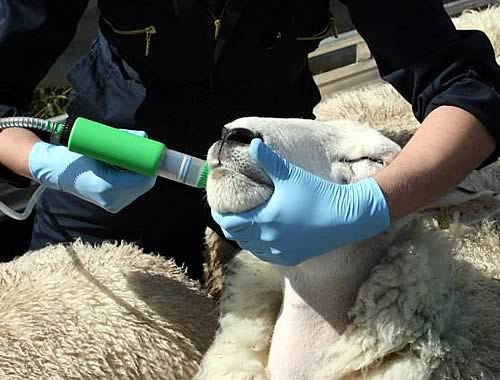| 2018-03-21 |
New Research shows Farmers can Save Money at Lambing Time
Anthelmintic treatment of ewes around lambing time, often with long-acting products, has become common practice on UK sheep farms.
However, new independent UK research carried out over three years by the Animal Plant and Health Agency (AHPA) and funded by the Veterinary Medicines Directorate (VMD) has found no advantage in blanket worming ewes at lambing.
Faecal egg counts from lambs reared on ewes that were wormed with either a short-acting or long-acting wormer were not lower than faecal egg counts taken from lambs reared on ewes not treated with a wormer. The study supports data generated by other researchers suggesting the practice of treating ewes at lambing to reduce contamination on pasture and minimise subsequent disease may not always result in lower levels of infection in lambs.
Jane Learmount, lead research on the
project, says:
“Over-use of anthelmintics is a major factor in the
development of resistance,and treating adult sheep unnecessarily only
adds to the problem. We had the opportunity to see if this widely
adopted practice of worming ewes at lambing really was beneficial
to the lambs by analysing our data from our long-term project involving
16 commercial farms. The bottom line is that we could not demonstrate
any clear benefit in terms of worm infection levels in lambs as a
result of worming ewes on the farms studied.”
This research provides further support for the Sustainable Control of Parasites in Sheep (SCOPS) recommendation to use a targeted approach to the administration of wormers on sheep farms, including leaving the fittest ewes untreated around lambing.
Peter
Baber, sheep farmer and SCOPS
Steering Group Chairman, says:
“With sheep farmers increasingly aware
that worm control is no longer as simple as regularly using a wormer
(anthelmintic), this is an important finding. If you haven’t had resistance
to one or more groups detected on your farm, chances are you know
somebody who has and who is struggling with the consequences. These
days, maintaining control of worms is all about striking a balance
that minimises the risk that the worms will become resistant on your
farm.”
Lesley
Stubbings of SCOPS says:
“SCOPS has been working with a number of farms
for several years and they are not seeing any downside to worming only a small
proportion of their ewes. This research finding is a massive step forward.
We have been advising farmers to leave 10-20% of their ewes untreated, but
now with the support of the findings of this large project, we can confidently
tell farmers that they only need to treat that proportion of the flock that
is below ideal condition or immature shearlings or ewe lambs.”
One of the farmers
involved in this work is Gareth Owen of Abbey Farm, Leicester. He says:
“We
have monitored ewe egg output in the run up to lambing for several years and
have convinced ourselves that the majority of our ewes do not shed many eggs.
Consequently, only our shearlings and the few leaner ewes are treated at lambing.
I must be able to control worms in the long term and am not prepared to risk
accelerating the development of resistance on the farm by administering indiscriminate
ewe treatments simply because that’s what we always used to do. The fact it
also saves us a lot of money is an extra bonus.”
The message from SCOPS is, before you fall into spending money on wormer for your ewes this year, stop and think about how you can save money and at the same time protect the future of your flock from anthelmintic resistance. Be selective, only treating those ewes that need it, and help preserve your wormers for the future.


